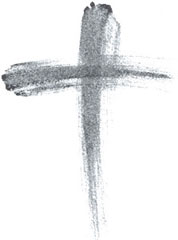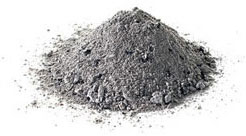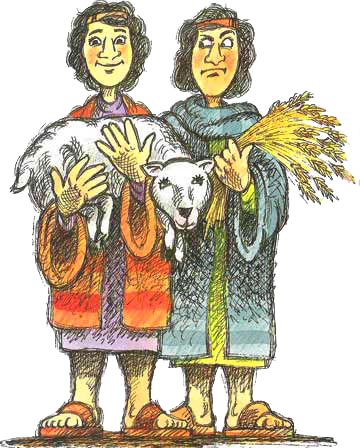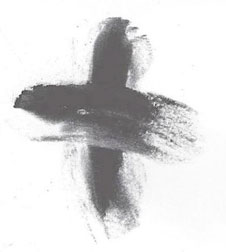
Reflection by Deborah Beach Giordano
An Outward Sign?
 A swath of ash upon the forehead and we are marked for all to see: Christians, repentant of our sins — whatever they may be. But tomorrow, or later today, after we’ve wiped the smudge away, we’ll once again be indistinguishable from everybody else.
A swath of ash upon the forehead and we are marked for all to see: Christians, repentant of our sins — whatever they may be. But tomorrow, or later today, after we’ve wiped the smudge away, we’ll once again be indistinguishable from everybody else.
So what’s the point? Why do we bother (if we do) with the Ash Wednesday tradition of prayer and penance; what does it really mean?
There was a time when these ashy crosses were common sightings, now — at least in my region — they are extremely rare. Some people may recognize the significance, but many may think the wearer is a chimney sweep, or changed the toner at the office and brushed away a lock of hair. It doesn’t appear to serve as a “testimony” to our faith, yet it is an outward sign that we carry upon our person that only others can see.
What can it mean?
Marked
 It is said that ashes are signs of repentance, embodied acknowledgements of the sins and shortcomings that accompany us — that taint us, in fact, soiling our souls, and distorting the beauty and basic goodness with which our Creator imbued us. These are visible to others, even if we do not recognize them ourselves. Further, as we’ve seen with Job, the king of Ninevah, and others, covering one’s head with ashes is a cry for divine mercy and forgiveness. The wearing of sackcloth and ashes is a demonstration of grief and misery, a physical manifestation of a cry for holy intervention: “We’re suffering here, and need Your help!”
It is said that ashes are signs of repentance, embodied acknowledgements of the sins and shortcomings that accompany us — that taint us, in fact, soiling our souls, and distorting the beauty and basic goodness with which our Creator imbued us. These are visible to others, even if we do not recognize them ourselves. Further, as we’ve seen with Job, the king of Ninevah, and others, covering one’s head with ashes is a cry for divine mercy and forgiveness. The wearing of sackcloth and ashes is a demonstration of grief and misery, a physical manifestation of a cry for holy intervention: “We’re suffering here, and need Your help!”
But these temporary marks — so easily erased — hardly serve as any sort of lasting calls for help.
Another explanation is that the ashen crosses are reminders of our mortality: “ashes to ashes,” as the saying goes. All our lives here will end and no one knows, for certain, at what day or hour that will be, therefore we ought to live mindfully, thoughtfully, charitably.
But, again, this dusty reminder is a brief one, at best — and one that we, ourselves, cannot see.
What do we know about smudges and marks and those who carry them — marks that cannot be erased, marks that others can clearly see? Perhaps the most famous in this category, as related in the holy Scriptures, was “the mark of Cain.”
The Mark of Cain
Surprisingly, we know nothing about the mark itself; what it looked like, how large it was, where Cain carried it, or if it ever faded. What we do know is how he came to have it. And that, to me, makes it perfect for our purposes — for are we all not, in our own ways, children of Cain?

Who among us can fail to identify with the frustrated, unappreciated, distressed, and angry soul? Who hasn’t been shocked and confused when our best efforts are ignored, our hard work rejected, our talents and skills undervalued; while others are treated with favoritism, given awards, are chosen for promotions, are celebrated and generally adored? While Cain most assuredly over-reacted, we’ve all considered ways that we might “eliminate the competition.”
And we’ve all complained at perceived unfairness, we’ve all been disappointed, jealous, resentful; we all want to be “the favorite,” to be recognized and admired. It takes practice — and humility — to say to ourselves, as God tells Cain, “To do your best is enough.” Maybe Abel needed more encouragement, maybe the work was harder for him, maybe God was saving the best for last. Or perhaps it was another reason altogether; some things remain unknown to us.
But Cain could not control his resentment or his anger, and acted in an all-too-human way; just as the Snake in the Garden warned his parents, choosing “to be as gods” — not to give life, but to end it. That, I suspect, is what truly constitutes “original sin”: our desire to decide who shall live and who shall die.
And so the man did not bless, but cursed — and destroyed — his brother, and forever after carried the imprint of that terrible crime on his soul.
A Mark of Forgiveness
 The earth that had been good and generous became barren and hostile, as if his brother’s blood cried out from the very soil; Cain had made himself a stranger in his own land. He was no longer welcome, no longer at peace, no longer secure; estranged from all that was comfortable and familiar. Weirdly, despite what we might expect, God does not condemn him to suffer and die, does not exact vengeance or demand restitution, does not put a price on his head, but sends Cain forth with a sign of divine protection. Despite what Cain has done, God’s love prevails.
The earth that had been good and generous became barren and hostile, as if his brother’s blood cried out from the very soil; Cain had made himself a stranger in his own land. He was no longer welcome, no longer at peace, no longer secure; estranged from all that was comfortable and familiar. Weirdly, despite what we might expect, God does not condemn him to suffer and die, does not exact vengeance or demand restitution, does not put a price on his head, but sends Cain forth with a sign of divine protection. Despite what Cain has done, God’s love prevails.
The mark of Cain is a sign of sin, of wrong-doing, of those things we have done that we ought not to have done and those we have left undone that we ought to have done; it is a sign of our ever-present temptation to “be as gods”: to tear down, to destroy, to annihilate. And it is a sign of God’s great mercy and compassion: whatever we have done or left undone, the Eternal does not desire our death or suffering. Instead, we are marked for safe-keeping.
The mark of Cain is a glorious blessing. It is God’s indelible claim on us; we are His, always and ever. No matter what we have done or left undone, we are precious and beloved to our Creator. Surely there is no better or greater mark than that to etch on our hearts and in our minds — on Ash Wednesday and every day of our lives.
May Christ’s peace and joy abound,
Deborah ✟
Suggested Spiritual Exercise
As we enter into the season of Lent, recalling God’s great love for us, the best Thank You we can give in response is to do unto others as has been done (by God) to us.
Think! Remember you are all My children whom I brought into being; you are one people, one family. Then the Light will shine forth through you, as radiant as the noonday sun; your people will grow well and strong almost overnight; you will be surprised by the joy surrounding you. God will be your Guide and your Defender. Then when you pray, you will hear the Eternal answer; when God calls, you will say: “Here I am.”
If you cease your slander and your slurs, your accusations and antagonism against one another, if you do yourself what you demand from others — taking as much note of the smudges on your own faces as on those of your neighbors’; if you, personally, are generous, compassionate, and caring, then the light will break through; your sorrows will disappear, your confusion will vanish. The Eternal will guide you by day and by night, and nourish and strengthen you; you will be like a watered garden, vital and vibrant. What has broken will be repaired, what has fallen shall be restored; generations to come will call you blessed.
~ Isaiah 9b-12 ~ interpreted by Deborah